#apollogists
Explore tagged Tumblr posts
Text

The fact that Python is Apollo's greatest enemy and snake is Asclepius' sacred animal will always be funny
Part 2
#Apollo#Asclepius#greek pantheon#greek mythology#greek gods#mythology#greek myth art#apollogists#dadpollo#python#chiron#toa#pjo hoo toa#trials of apollo#riordanverse#my art
7K notes
·
View notes
Text
pre toa apollo is the type of person to arrive to a council meeting 20 mins late with starbucks and excuse himself with 'sorry i'm late i didn't want to come'
post toa apollo is the type of person to arrive to the council meeting exactly on point down to the second and spend the whole thing smiling vacantly and giving the most vague non answers that are still somehow perfectly diplomatic and then leave also the exact millisecond it ends
#pre toa apollo made a sport out of making everyone agree with him#while acting and phrasing things in a way the ideas were NEVER traced back to him#post toa apollo has a manual on every way every person in this room could react when confronted with any stimuli possible#and how to react accordingly to everyone of them#he's also actively plotting your downfall❤️😊💕#toa#trials of apollo#toa apollo#pjo apollo#apollogists#the trials of apollo
229 notes
·
View notes
Text
y'all wanna know what pisses me off? even if you don't, imma tell you anyway
I've been seeing it ALL over the place, but it's from all these pjo fans who never read toa, but then they somehow get it in their heads that jason didn't know leo was alive when he died? but he definitely did, apollo told him and piper pretty early on.
and then they get pissy over the fact that jason died, which is dumb. good stories aren't always the ones where everyone lives, and Jason's death definitely had purpose, even if you didn't like what it was - that's what a tragedy is.
but i'm over here literally begging people to actually read the series. and then it's just completely false information floating around that everybody believes right off the bat because they want to hate toa so bad.
just my two cents.
403 notes
·
View notes
Text
The torment of enjoying blondes with daddy issues

109 notes
·
View notes
Text

HC/AU (idk which one this goes to :P) where prophetic gods, like Phoebe, Themis and Apollo, usually have their eyes closed/covered since it helped them focus more to see through their other eyes (aka, lowkey wanted to try drawing Apollo with a more eldritch design ^^;)
#apollogists#apollo#phoebus apollo#phoebe#themis#greek mythology#toa#trials of apollo#headcanon#au#my art
179 notes
·
View notes
Text
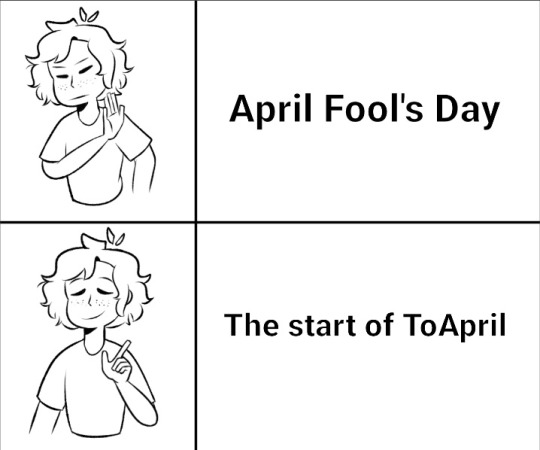
ToApril back! 804 dead, 77 injured
#pjo#toa#rrverse#trials of apollo#trials of apollo memes#apollogists#pjo apollo#lester papadopoulos#toa fandom#holy crap 2 posts within 5 months of each other!
270 notes
·
View notes
Text
The Prophecy [Oh, Was It Punishment?] Masterlist
*note* Hi everyone! This will be a unknown multiple part fic following Apollo and reader after the war against Gaia. I haven’t finished ToA, so I will be taking some liberty in writing this fic. My end goal is to go beyond TSATS and create my own ending for the characters.
Part One
Part Two
Part Three
Part Four
Part Five
………
#percy jackson#pjo apollo#trials of apollo#ToA#Apollo x reader#pjo apollo x reader#apollo x y/n#pjo#x reader#fanfic#Percy Jackson x reader#will solace#nico di angelo#meg mcaffery#leo valdez#jason grace#hazel levesque#frank zhang#piper mclean#annabeth chase#percabeth#solangleo#child of hermes#hermes pjo#Artemis#zeus#zeus bashing#apollogists#the prophecy [oh was it punishment?]
122 notes
·
View notes
Text
i think apollo will stay changed after becoming human
first time making something like this. so uh, yeah, kinda sorta analysis after the cut and a lot of this is based off of this analysis and also the toa discord. yeah. let's get this started
i think that apollo will stay "human" even after regaining godhood because that's the point. it's a story about growth, healing, change, hope, and identity. apollo lost his, not just by being put into lester, but his identity, as apollo the god.
and it isn't just apollo. meg is a big one as well, her arc sort of mirroring apollo, with nero being compared to zeus quite often in the narration. i think another arc that sort of mirrors apollo's is reyna. her arc is centered around identity. she needs to find it outside of the senate. apollo needed to find it outside of olympus. and quite ironically, the roman camp is called camp jupiter. and it was reyna that told apollo something he needed to hear. sure, he could never take back all of the shitty things he has done in the past, but he can still do good.
apollo thought he was the worst of the gods, all because he felt. all because he felt devasted when his loved ones died. all because even after all of that pain, he still loved. that is who he is at his core. someone who loves.
the reason he couldn't change at the start was because that man was in denial. but if you ignore his, i will admit this as someone who loves toa, kinda annoying narration and read just his actions, he is actively putting himself at risk to save percy, meg, his kids. he even knows the names of connor and travis, even knowing their personalities enough to know that they are pranksters. because that's who he is behind all of the glitter and blinding smiles. someone who cares, but can't show it.
how can i talk about apollo's change without mentioning jason. jason, i think, is the push that caused him to decide to change. "remember what it's like to be human." apollo and jason both sacrificed themselves for the team, only difference is that jason's stuck. this was his push. that apollo, as the god, could've helped. and that's was what he was going to do.
and in ton, we meet the troglodytes. they called him lester-apollo. lester was used as an epihet for apollo. this is mentioned in the toa server if this rings a bell. lester is now a part of his identity. it's so deeply engrained.
he may forget the people's faces, but their impact will never leave them.
apollo will stay changed because he wants to change. he wants to take those steps. that's what sets him apart from the olympians, the ones who live by one saying. "gods can't change." they can, they just don't want to. because that would mean, admitting what they did wrong and feeling guilt. apollo already was doing this, clear from the song that he sang in tho. he just needed a push.
but there is still hope. the nod from athena showing comradery. the idk what to call it with hera. apollo's trials didn't just impact him, it impacted all of olympus. for better or worse.
sure, maybe he will relapse, turn back into the selfish god he was. but why would you want to believe that? it's a story about hope. so have some.
#trials of apollo analysis#sort of#trials of apollo#pjo apollo#lester papadopoulos#apollogists#rrverse#reyna avila ramirez arellano#toa analysis#toa#please if you have more thoughts and are more eloquent#please add on#percy jackon and the olympians#heroes of olympus
165 notes
·
View notes
Text
hc that somehow, apollo gets the worlds worst brain freeze and it frustrates him because technically, he probably doesn’t even have a brain. he has developed a love hate relationship with ice cream over it, and has written woeful poetry about it.
bonus: he doesn’t get brain freeze as lester.
#he’s so dramatic#i say as if i didn’t just make this up#riordanverse#trials of apollo#apollo#lester papadopoulos#toa#apollo toa#toa apollo#meg mccaffrey#percy jackson#pjo#heroes of olympus#hoo#apollogists#apollo posting#lester toa#lester papadopoulos textpost#lester papadopoulos headcanon#apollo headcanons
224 notes
·
View notes
Text
LESTERCORE





#trials of apollo#lester papadopoulos#apollo#rick riordan#apollo my beloved#apollogists#toa#lester/apollo#Lestercore
153 notes
·
View notes
Text
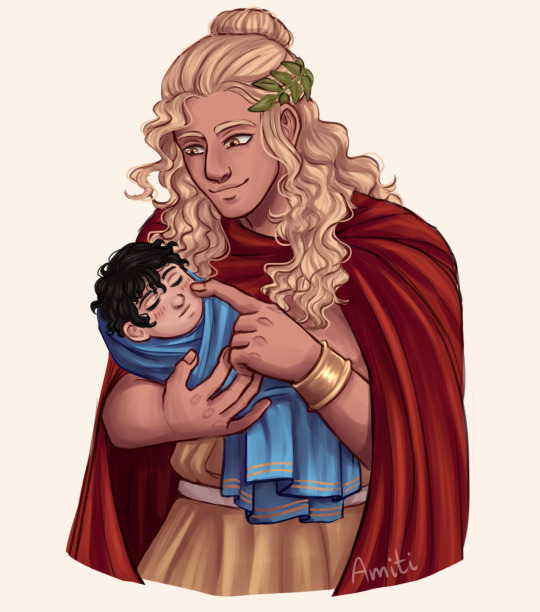


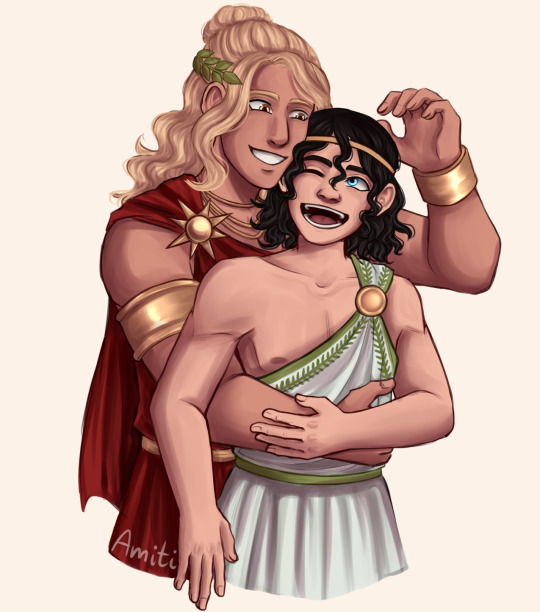
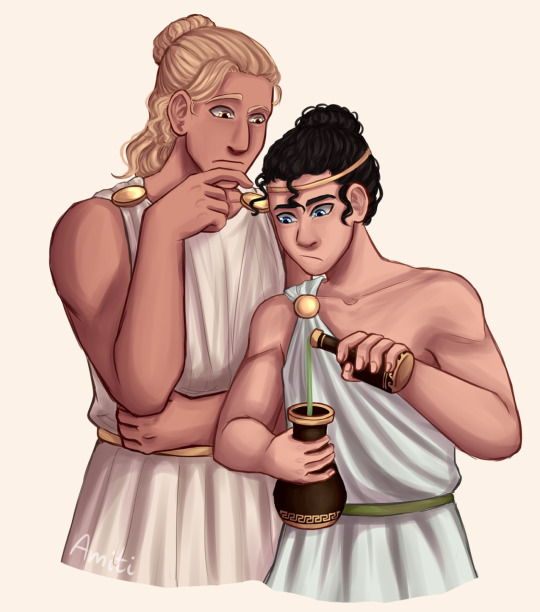
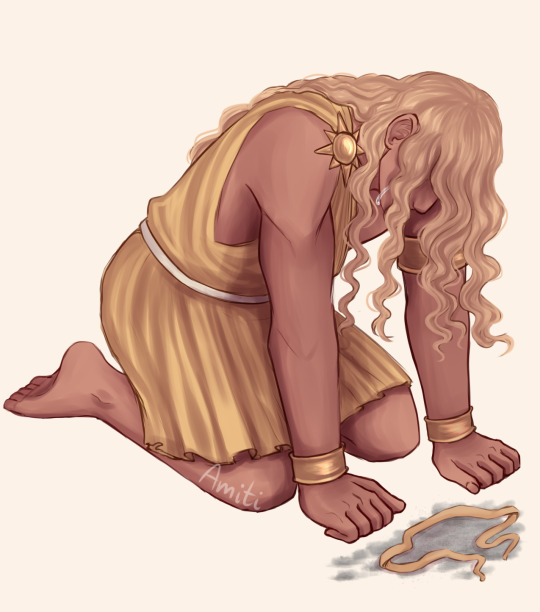
Apollo and Asclepius
At first I wanted to draw Apollo hugging Asclepius' dead body for the last piece but I realized that there would be no body left after a mortal who was struck by Zeus' lightning 😔.
(The hair band survived because it was gift from Apollo and therefore made from the same devine material gods' clothes are made. Before he got this one, Asclepius was always accidentally tearing or losing the previous ones so Apollo wanted to give him one that could not be destroyed so easily)
#despite being Apollo's most famous child Asclepius is criminally underrated#Apollo#Asclepius#Asklepios#greek gods#greek pantheon#greek myth#greek mythology#dadpollo#apollogists#toa#my art#art#mythological
2K notes
·
View notes
Text
when I'm reading toa fics and someone tells apollo that he's changed: a aaaaaaaaahhh
because I know, I know it's in character
but does the writer believe it?? and in which way???
because the thing about apollo i think, is that he did change in the trials but it was not in becoming a better person (it was about trusting and letting others in and finally giving up on zeus)
because he already was a good person when we meet him
and that's the thing
when we meet him
because he's already changed before
all these things people think his arc was about, all the lessons he supposedly speedran
oh he had that arc alright, he learned those lessons
long long before we ever meet him
like do you really think a god that supposedly narcissistic and shallow (NOT that I think those were ever his vices but that's the narrative they're trying to sell us) would ever act as he did??? change so much in just a year?? change so positively???? (because contrary to popular belief extreme pain and trauma do not generally make you a better person, especially not to a person with such a supposedly negative baseline personality)
he never struggles with or even LEARNS any lessons on morality, the ideas always magically spring fully formed because he already knew them he already has his own ideologies
what he does struggle with and has to learn is SINCERITY because THAT'S WHAT HIS ARC IS SECRETLY ALL ABOUT
and of course he has to vocalize his apologies since, well he never did say them
but make no mistake the apollo of at the very least the past century would have never done the things he's currently apologizing for
171 notes
·
View notes
Text
What even are the ancient laws?
I've been meaning to get around to this one for ages.
Anyways! Good question, guys! Answer: nobody fucking knows. Sure, we have good ideas. The laws are mentioned every now and then as a "oh, no little mortal child I can't help you - that's against the ancient laws. But hey! You can help me."
Let's be honest: the ancient laws, while there might be legitimate reasons for some of them, have transformed into yet another way that the gods hold themselves as the high and mighty overlords of the world, and keep their mortal offspring below them at all costs. But... why? Are the demigods really that dangerous to the gods? The answer: yes, but not to the gods - to Zeus.
Let's start from the beginning and list out everything we know about the laws. I did the hard work, you're welcome:
1. Gods cannot steal each others' symbols of power.
2. A god cannot initiate a fight with a mortal.
3. No direct interference - gods are not allowed to interfere in the lives and ongoings of mortals or monsters.
4. No more than 3 people are allowed on a quest.
5. Harming the sacred animals of a god is forbidden.
And that's it. Those are the only true mentions of the Ancient Laws in the entirety of the Riordanverse (at least, the Greco-Roman books).
And I think we all know what the most important one is. Direct Interference is the only one we see Zeus actively enforcing (or at least attempting to). But why is that? Well, stealing another god's symbol of power and initiating a battle with a mortal are physically impossible for gods, and the ban on harming a sacred animal is very commonly accepted already, as it's a guaranteed way to get your ass whooped. And the rule about having 3 on a quest isn't really something Zeus is going to spare the effort to enforce - starting a quest with more than 3 will typically guarantee that you come home with only 3, if at all.
But Direct Interference is the most interesting law, simply because it's the one that our demigod narrators are affected by the most, either in the ways their godly parents violate it, or refuse to do so.
There's plenty of instances where this law has had quite a bit of impact on the story and relationships. For example, Hermes used this law as a major reason why he could not help Luke or prevent him from raising Kronos. But let's be honest: besides Zeus himself, Hermes might be one of the only gods that actually obey this rule, despite the fact that he wants to break it. Just off the top of my head, I can name an instance in the series where every single Olympian at least toed the line of violating Direct Interference, except for maybe Demeter. And I'm not sure Dionysus counts, since he has contact with his half-blood children because of his position at CHB.
But there's something interesting even about the ways these gods break the law of Direct Interference. In most instances, these interactions with mortals happen when the god is in disguise, or through dreams. And, based on how little it seems like the gods get punished for breaking Direct Interference, we can only assume that Zeus is not aware of when gods talk to demigods via dreams. I mean, he's probably aware that it happens: Apollo, Poseidon, Hephaestus, Aphrodite, Hera, Ares (who occasionally follows the rule, but only as an excuse to not help a demigod out), Artemis (although she is subject to exceptions due to her domain), Dionysus, Athena (I think?), and Hades all do it at least once in the RRverse. I mean, you could also argue that dreams are a more indirect means if interference, but I can also see how that's an iffy argument at best.
So, what does this mean? If there is one thing I know about laws and rules in general is that people tend to break laws if the direct consequences of their own actions don't directly apply to them. Gods would probably respect the law of Direct Interference more if there was an immediate negative effect on themselves, aside from just the punishment.
Think of a law or a rule that people break all the time. Littering, for example. People do it all the time, even though it's bad. But why is it bad? A person who doesn't have a lot of forethought will drop a piece of trash and say 'hey, that doesn't affect me. The planet will suffer and this will be a pain in the ass to clean up, but I'm not the one cleaning it up, so why do I care?' If you don't care about the planet or other people cleaning up your trash, the only reason you have to not litter is that you're afraid of the punishment.
I think the attitude towards Direct Interference is similar. The only reason a god would obey is if they're afraid of the punishment, or if they respect Zeus enough to follow his laws (which, clearly, is not the norm in godly society). And even then, what is a punishment to an immortal being? The only way Zeus punishes gods that really matters to them is turning them mortal - and that's a very rare occurrence.
By that logic, we can assume that a violation of Direct Interference does not actually negatively affect gods all that much. To be honest, it doesn't negatively affect mortals either. Maybe monsters have the short end of the stick, but monsters didn't write the law of Direct Interference - Zeus did. So... why? Why does it exist?
My first thought was the Fates and prophecy - if gods can interact in mortal life without recourse, then it might fuck with the way the Fates operate. But gods have been interfering for the entirety of civilization. If they really had a the power to alter the future just by dipping a toe in mortal life, don't you think it would have been obvious? Even in the RRverse, there are plenty of instances, as I've mentioned, that gods have interfered in a quest, and said quest wasn't severely fucked over because of that interference. Take, for instance, Percy's quest to save Artemis - Apollo intervened, but where were the consequences of that? Where were the earth-shattering effects?
So what gives? Also, I'd argue that the gods would actually obey the law more if they knew it had such a negative effect on the proper functioning of the Fates, especially Apollo since that's his domain. So I'm going to say that's not the case.
So we're back to the first question: why does the law against Direct Interference exist if it has no effect on the gods or the Fates? In all references to the law against Direct Interference in the Riordanverse, never once is it explained why this law exists. Why would Zeus create it if violating it doesn't have some major world-ending effect? Gods are gods: what could make this law so important that it's the only one Zeus makes a true effort to enforce?
Well, it makes sense to me that Zeus would create the law if he's the one who has to bear the immediate consequences of it. Which raises the question: what are the immediate consequences? What reason could Zeus possibly have to separate half-blood children from their godly parents? HMmmmmmmMMMM.
Well, there's another interesting thing about the Ancient Laws: some of them don't apply to mortals. Mortals can steal a god's symbol of power, and mortals can initiate battles with gods. Imagine with me a scenario in which your enemy has an army that is not subject to the same laws you are. Gods are (as far as I know) physically incapable of stealing symbols of power and starting battles with mortals, but what does that matter if they have half-blood children that reach the power of minor gods, like Percy, who can do that for you?
It's a terrifying premise, if you're Zeus. And before you start telling me that I'm going down yet another far-fetched rabbit hole (listen - I always make sense in the end), we've seen Zeus go down this line of thought before, all the way back in The Lightning Thief. Remember???
Chiron said that the reason Zeus blamed Percy for stealing the Master Bolt was because the mines the Cyclopes used to forge the bolts is close to Poseidon's domain, and he thinks Poseidon has it out for him. Now, there's a theory running around the TOA fandom that gods can control how much power they hand off to their children (as seen with Apollo's children, who rarely inherit the power of prophecy, which we're willing to bet is something Apollo is controlling from behind the scenes), and if Zeus knew that Poseidon had had a child, it's possible Zeus thought Poseidon was trying to create a super-child just for the sake of overthrowing him. I'm willing to bet that one of his greatest fears is that an über-powerful child of one of his brothers would be used to steal his symbol of power and then overthrow him. He views demigod children like weapons that his enemies can use because they could be inherently dangerous to the standard structure of godly society. His main fear is somebody with the motivation of Luke having the power of Percy. And what do paranoid kings do when presented with the idea of their greatest fears? Make laws against them.
The only way Zeus could be sure that Poseidon would never intentionally have a child like Percy, then bring him under his wing just in time to start a rebellion against him is to ban that kind of interaction at all.

Counterpoint: you could also say that the law against Direct Interference was a way to protect the mortals against the gods who might harm them or do them dirty. Like getting women pregnant while in the form of a swan. Ahem ahem. Do you get my point, though? It's not like Zeus has any real reason to protect the mortals in this way, since he was one of the main perpetrators anyways, but it is a damn good excuse if he also wanted a reason to prevent a potential revolution led by demigods.
Now, if you'll bear with me for a little bit longer, there is one more interesting thing I'd like to point out: In the entirety of Trials of Apollo, Apollo (a god, obviously) only mentions following the Ancient Laws once. Unsurprisingly, at the time he's mentioning the law against Direct Interference, he's also violating it - when he kills Commodus to save lives, Rome, and for his own peace of mind. So, to me this basically means that Apollo doesn't give two single shits about following laws against Direct Interference.
Connect that with everything else we know about Apollo post-trials: he loves his kids, doesn't want to see them hurt, and is trying to distance himself from Zeus and godly society. Even pre-trials, he doesn't have any trouble admitting that Zeus makes his rules and laws difficult to follow - nobody is good enough in Zeus' eyes. I truly believe, if there's any person who, given the proper means and motivation to overthrow at least some aspects of the Direct Interference law, he would.

Just saying. Feel free to add on if anybody else has more thoughts!
[a masterlist of my other metas]
#riordanverse#toa#trials of apollo#apollogists#pjo#lester papadopoulos#apollo#percy jackson#meta#theory#fan theory#ancient laws#pjo apollo#pjo zeus
212 notes
·
View notes
Note
TRIALS OF APOLLO SUPREMACY 🛐🛐🛐🛐
YESSSSS
TRIALS OF APOLLO>>>>>>>
#pjo apollo#apollogists#trials of apollo#lester papadopoulos#toa apollo#Sorry if this is late#I'm not on this account a lot
44 notes
·
View notes
Text
"Be not afraid"

“My lord this is the sexiest moment of my life.”

(+ small doodle bcs I can't contain myself orz)

(also a none glitch version)

#apollogists#apollo#hyacinthus#phoebus apollo#hyapollo#toa#trials of apollo#greek mythology#eldritch#headcanon#au#my art
131 notes
·
View notes
Text
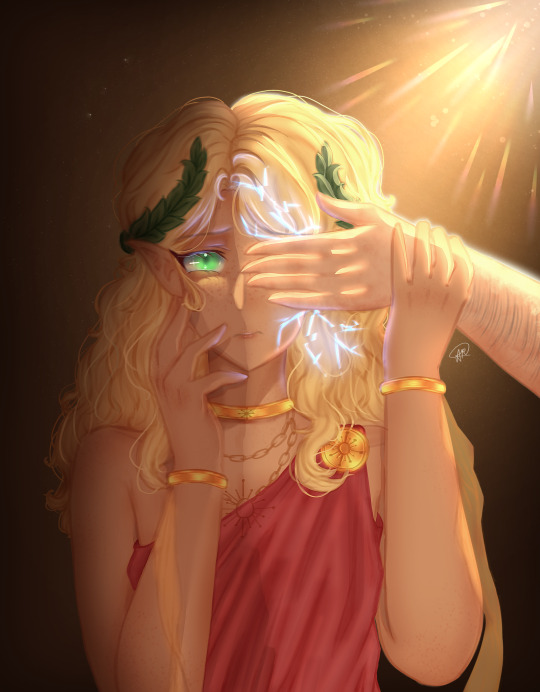
Name your courage now;
We could have had anything, anything else,
Instead you hoarded all that's left of me.
Swallowing your doubt,
Like swords to the pit of my belly,
I want to feel the fire that you kept from me.
#Apollo and Zeus' relationship feel 'The Moon Will Sing' coded#that's probably just me though#I need to draw apollo with the prophecy green eyes more#apollo#lester papadopoulos#toa apollo#apollo toa#toa lester#apollogists#pjo apollo#zeus#pjo zeus#pjo#percy jackson and the olympians#hoo#heroes of olympus#toa#trials of apollo#pjo hoo toa#greek mythology#apollo greek god#apollo greek mythology#apollon#starryseas sketches
286 notes
·
View notes